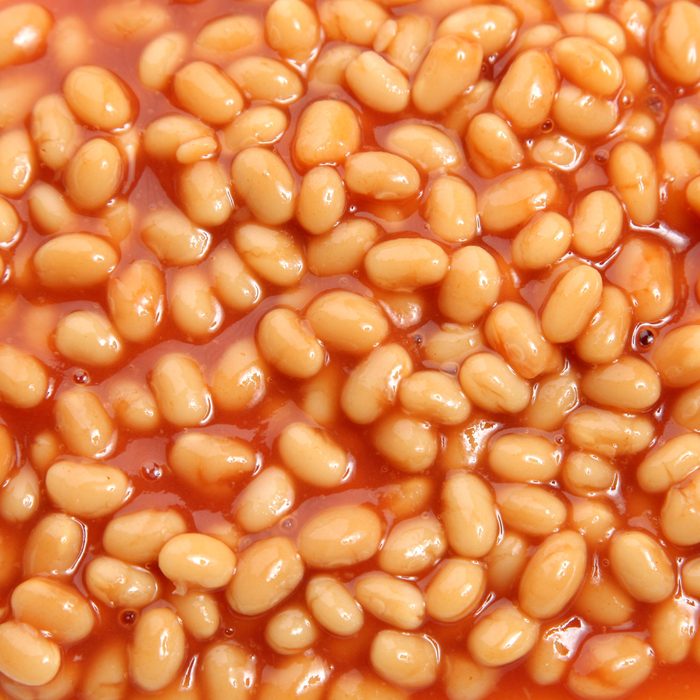I Ate Beans Every Day for a Week—Here’s What Happened
Updated: Sep. 08, 2023

A reporter took on a daring dietary experiment and spoke with three nutrition experts to get the scoop on all things beans.
If you ask me, the health benefits of beans make them one of those foods that just don’t get enough credit. Whether they’re in a dip, a tasty chili, or roasted up in the oven as a protein-rich snack, beans are an incredibly versatile staple that lend themselves to a variety of uses. “All beans are great sources of complex carbohydrates, fiber, foltate, potassium and iron,” says registered dietitian Marissa Sommers, RDN. “They’re a nutrient-dense source of plant protein that can be used in a variety of dishes. They go great in tacos or burrito bowls, mixed in with a sheet tray of roasted veggies or added as a complex carbohydrate source to salads.” Plus, beans are a relatively affordable pantry buy.
So, when I was tasked with the assignment of eating beans every day for a week to see how my body would react, I figured it would be a worthwhile experiment to see how I could stretch both my budget and my creativity in the kitchen. The added health benefits I learned about were just a bonus.
“Beans are a convenient source of protein, fiber and micronutrients in our diet,” says Jenna Werner, RD, owner of virtual nutrition coaching website Happy Strong Healthy. “They’re shelf-stable, affordable and pre-cooked, which makes meal time creation easier and can decrease meal stress. They’re also shown to have cardiac and digestive benefits due to their nutrient composition and may help keep blood sugars stable when consumed as part of a meal or snack.”
Throughout my week eating beans, I ate a variety of legumes in varying levels of recipes. Here’s what I learned—with insight from experts on all the details that make beans a nutrient-packed favorite.
7 Best High-Protein Dinner Ideas for Weight Loss
Eating beans every day for a week made me feel more full
Lately, I’ve noticed myself getting more snacky in the late evenings. In an effort to curb mindless nighttime snacking, I’ve been trying to make a conscious effort to incorporate more protein into my meals throughout the day. Turns out, beans were just the thing!
According to Hannah Magee, RD, this could be in part due to the fiber content of beans. “Beans can be beneficial to the overall diet in many ways,” Magee says. “First and foremost, they’re a fantastic source of fiber: Something that many North Americans don’t eat enough of. Depending on the bean, a cup of cooked beans can provide anywhere from 10 to 15 grams of fiber, which is about half of the recommended fiber intake for adults right there.”
Additionally, Magee adds that beans are a source of plant-based protein, which can help to fill you up and keep you full for longer periods of time. “They’re a great way to add some additional protein to a meal, or they can serve as the sole source of protein,” she says.
Here’s How Much Fiber You Really Need in a Day
I was more regular during my week eating beans every day
While beans have numerous benefits, some of those benefits are accompanied by some rather unpleasant side effects, such as increased gas. But even so, the benefits associated with the increase in fiber helped keep me regular during the week, which is never a bad thing.
According to Werner, the fiber in beans can also help regulate blood sugar and contribute to better digestion.
5 Easy Steps to Reset Your Gut Health, Says a Doctor
If you eat beans often, you might lower your blood pressure
In addition to the benefits the additional fiber and protein provided to my diet, I was excited to learn about the other nutrients responsible for the health benefits of beans. As someone with a history of high blood pressure in my family, I’m always on the lookout for foods that can help aid in protecting my blood pressure from an unhealthy range. Once again—beans for the win.
“Beans are a rich source of two important minerals for blood pressure regulations: magnesium and potassium,” says Sommers. “There are many factors that impact blood pressure including diet, activity level, alcohol intake, and more, but adding legumes could have the potential to help reduce overall blood pressure.”
Here’s How Often You Should Actually Take Your Blood Pressure, According to a Cardiologist
What I learned from my week eating beans every day
During my week eating beans every day, I learned quite a bit about the added health benefits associated with the small-but-mighty legumes. (I also saved quite a bit of money on my grocery bill by replacing some of my meat-focused meals with beans, instead!)
One of my biggest takeaways I learned is that variety is key when it comes to incorporating beans into a daily diet. Happily, there are plenty of options to choose from—and they’re all packed with benefits. “You don’t have to be plant-based to reap the benefits of adding more beans!” Sommers says.
You can’t beat it—I’ll be stocking up on beans on the regular from now on.
Get The Healthy @Reader’s Digest daily newsletter and follow us on Facebook and Instagram for more. Keep reading:





















